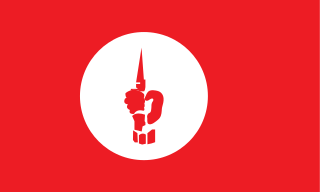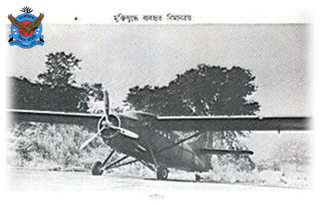
The Bangladesh Armed Forces are the military forces of the People's Republic of Bangladesh. They consist of the three uniformed military services: the Bangladesh Army, the Bangladesh Navy and the Bangladesh Air Force. The Armed Forces are under the jurisdiction of Ministry of Defence of the Government of Bangladesh, and are directly administered by the Armed Forces Division of the Prime Minister's Office. The President of Bangladesh serves as the Commander-in-Chief of the Bangladesh Armed Forces. Bangladesh has the third-largest defence budget in South Asia and according to the Global Firepower index, The Bangladeshi military is the 37th strongest in the world and the third most powerful military force in South Asia. Border Guard Bangladesh and Bangladesh Coast Guard are under the jurisdiction of the Ministry of Home Affairs during peacetime, but during wartime they fall under the command of Bangladesh Army and Bangladesh Navy respectively.

The First and SecondBattles of Hilli were two major battles fought during the Bangladesh Liberation War on 22–24 November and 10–11 December 1971. They are generally regarded as the bloodiest battles of the eastern front of the Indo-Pakistani War of 1971. The first battle saw, according to veterans of the battle, the fiercest fighting of the war, but the second was much tamer.
Muhammad Ataul Gani Osmani, was a Bengali military leader. Osmani's career spanned five decades, beginning with service in the British Indian Army in 1939. He fought in the Burma Campaign during World War II. After the partition of India in 1947, he joined the Pakistan Army and served in the East Bengal Regiment, retiring as a colonel in 1967. Osmani joined the Provisional Government of Bangladesh in 1971 as the commander-in-chief of the nascent Bangladesh Forces. Regarded as the founder of the Bangladesh Armed Forces, Osmani retired as a four-star general from the Bangladesh Army in 1972.
The Battle of Dhalai was fought between India and Pakistan before the formal start 1971 India-Pakistan War for the liberation of Bangladesh. The battle started after an attack by Indian Army on Pakistani border outpost (BOP) in East Pakistan on 28 October and lasted until 3 November 1971. Three infantry battalions belonging to 61 Mountain Brigade, one battalion belonging to East Bengal Regiment and 7 Rajputana Rifles supported by an artillery-sized brigade of Indian army fought against a battalion-sized 12 Frontier Force of Pakistan army.
The Bangladesh Liberation War started on 26 March 1971 and ended on 16 December 1971. Some of the major events of the war are listed in the timeline below.
East Pakistan Air Operations covers the activity of the Pakistan Air Force (PAF) and Pakistan Army Aviation units in former East Pakistan during the Bangladesh Liberation War. The operations involved the interdiction, air defense, ground support, and logistics missions flown by the Bangladesh Air Force, Indian Air Force, and the Indian Navy Aviation wing in support of the Mukti Bahini and later Indian Army in Bengal.

Operation Jackpot was a codename for three operations undertaken by the Bengali Mukti Bahini in former East Pakistan against the Federation of Pakistan at the climax of the Bangladesh Liberation War.

Bangladesh's military history is intertwined with the history of a larger region, including present-day India, Pakistan, Nepal, Bhutan and Myanmar. The country was historically part of Bengal – a major power in South Asia and Southeast Asia.

Kazi Nuruzzaman Bir Uttom was a Bangladeshi war hero and secular nationalist, who served as one of the principal commanders of the Mukti Bahini during the Bangladesh Liberation War. He also rejected Bir Uttam award as a tribute to all the unknown, unrecognized martyrs of the war.

The Mukti Bahini, also known as the Bangladesh Forces, was the guerrilla resistance movement consisting of the Bangladeshi military, paramilitary and civilians during the Bangladesh Liberation War that transformed East Pakistan into Bangladesh in 1971. They were initially called the Mukti Fauj.
Z Force, also known as Tura Brigade, was the first military brigade of Bangladesh Forces formed during the Liberation War of Bangladesh in 1971 under Major Ziaur Rahman along with the consent of the revolutionary government of Bangladesh in exile. The brigade was formed with the 1st, 3rd and 8th Battalion of East Bengal Regiment on 7 July 1971. It is the first ever complete brigade formed during the Liberation War of Bangladesh in 1971.

Abu Taher Mohammad Haider, Bir Uttom was a Bangladesh Army officer and recipient of Bir Uttom, the second highest military award in Bangladesh. He fought in the Bangladesh Liberation War as the second-in-command of the K force under Khaled Mosharraf. Later he became the sector commander of sector-2 from 22 September 1971. After the assassination of the President of Bangladesh, Sheikh Mujib in a military coup; he joined a counter coup led by his former commander Major General Khaled Mosharraf. He was killed in a situation marred with confusion along with Khaled Mosharraf on 7 November 1975 by proponents of a counter coup led by Colonel Abu Taher.
S. M. Imdadul Hoque was a Bangladesh Army officer who fought and died in the Bangladesh Liberation war. He was posthumously awarded Bir Uttom, the second highest military honor in Bangladesh.

Kilo Flight was the code name for the Mukti Bahini combat aviation formation during the Bangladesh Liberation War in 1971. It consisted of one DHC-3 Otter plane and one Alouette III helicopter, both carrying rocket pods and machine guns for launching hit-and-run attacks on Pakistani targets, and one DC-3 Dakota for logistical missions. 9 Bengali pilots and 58 ex PAF personnel formed the unit under the command of Group Captain A. K. Khandker in September 1971. The aircraft were supplied by Indian Authorities and the formation was led by Squadron Leader Sultan Mahmud under the operational control of IAF base Jorhat. The unit started training in October 1971 at Dimapur in Nagaland, and this unit was the first to launch airstrikes on Pakistani targets in East Pakistan on December 4, 1971, by attacking oil depots at Narayanganj and Chittagong. In total the unit flew 90 sorties and 40 combat missions between December 4 and 16, 1971. After the war, this unit formed the core of the nascent Bangladesh Air Force.

Wakar Hasan, Bir Protik was a Bangladesh Army major and a member of the Mukti Bahini in the Bangladesh Liberation War. For his courage in the war of liberation, the Government of Bangladesh gave him the title of Bir Protik.
Badrul Alam was a squadron leader of the Bangladesh Air Force who fought in the Bangladesh War of Independence, for which the government of Bangladesh gave him the Bir Uttam award, the second highest award for individual gallantry in Bangladesh. In 2016, he received the Independence Day Award.

Dewan Mahbubur Rob Sadi Chaudhuri was a 1971 Liberation War veteran and war hero who valiantly led the Jalalpur sub-sector as Sub-Sector Commander of the Bangladesh Liberation Army under Sector Commander Maj Gen C. R. Datta. Sadi was awarded Bir Protik on 15 December 1973 for demonstration of personal acts of valor during the War. He was elected Member of the Parliament in 1979. Besides being a freedom fighter and politician, Sadi was also a singer, poet, columnist and songwriter. He was an active columnist for the Daily Manab Zamin and his articles and letters appeared in various national and international newspapers and magazines like The Economist, The Daily Star, The Daily Ittefaq and Prothom Alo. Sadi served as the Executive Director of Delta Life Insurance Company Ltd, and later founded a socio-political organization named Centre for Democratic Practice, dedicated towards fostering democracy and national consciousness and consensus in Bangladesh.
Akram Ahmed was a veteran of the Bangladesh Liberation War as a pilot as part of Operation Kilo Flight, the beginning of Bangladesh Air Force. For his bravery in the war, the government of Bangladesh awarded him the title of Bir Uttom, one of a few civilians to have received the award.
Mohammad Ziauddin, BU is a retired Bangladeshi military officer, who was the Commanding Officer of the 1st East Bengal Regiment during the Bangladesh Liberation War. He was awarded the Bir Uttom, the country's second highest gallantry award for his outstanding bravery in the Liberation War. His certificate number was 22.
Shahid Shamsuzzaman was a freedom fighter during the Bangladesh Liberation War. He was posthumously awarded with a Bir Uttam by the Government of Bangladesh.










